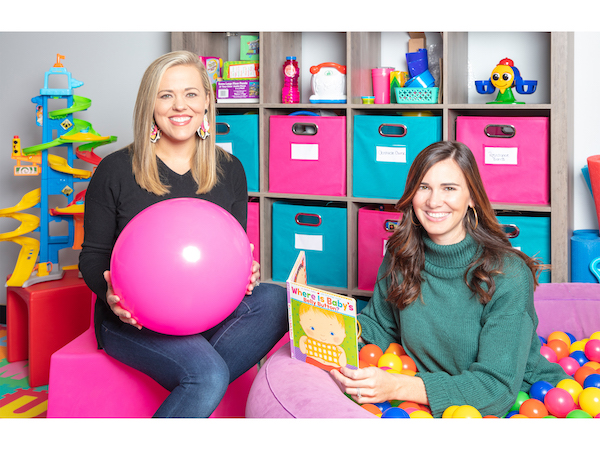Stroll down the hallways and peek into the rooms and cubbies at Now We’re Talking Therapy Services (NWT) at the Bridge Center in Bluffton, and you might say it looks like a fun place for children to play. And it is. But it’s also a place for children with language and other developmental delays or physical disabilities to be seen, heard, understood—and treated. It’s a place where parents can get the support they need to ensure that their children have the skills to succeed, now and in the future. It’s a place where the course of a lifetime can be changed.
Who needs therapy and why?
According to Ashley Cubbage and Leslie Bigwood, speech pathologists and co-owners of the pediatric therapy clinic, while it’s true that every child is different, certain milestones outline what most kids can do by a certain point in time. “If a parent has concerns about their child’s development, early intervention is key,” Cubbage said.
Nobody can attest to that more strongly than Bigwood, who first met Cubbage when her own son struggled with speech development. “As a speech pathologist, I knew what to be watching for. Everything he tried to say sounded the same. He got frustrated and stopped trying. At 15 months, we got the referral.”
Cubbage made home visits, working with Bigwood’s son to improve his language development. His progress was such that after 24 months, he no longer qualified for speech therapy services. Had Bigwood taken a wait-and-see approach, she’s certain her son would have had bigger problems down the road. “Early identification and early intervention is critical,” she said. “Research shows that the earlier you intervene, the better the outcome.”
A speech delay occurs when a child fails to develop speech and language at the expected rate. It’s a common developmental problem that can affect as many as 10 percent of children in the United States, according to the Centers for Disease Control and Prevention.
According to Cubbage, parents often begin noticing speech and language problems at around 12 months. “When children do not have an effective way to communicate, the result is frustration, crying, tantrums and meltdowns,” she said. These difficulties are most often identified by those spending the most time with the child including parents, grandparents, or daycare workers. “If a child isn’t identified early on or if their struggles don’t develop until later, they are often identified when entering school. They may have trouble reading, learning letter sounds, or recognizing sight words,” all of which can potentially lead to further learning difficulties as well as behavioral and/or social problems.
“Some families don’t start early because they fear some sort of stigma. If your child is in speech therapy, all it means is that you are doing the best thing you can for your child,” Cubbage said. “Why let your child struggle if there is a resource out there or a service they could benefit from? We’re here to give you honest feedback—to look at what the milestones are and look at where your child is.”
In addition to speech, NWT offers occupational and physical therapy services. “Occupational therapy is how well a child can do their occupation—which when you are a kid is to play and to participate in your environment,” Cubbage explained. That includes everything from self-feeding, dressing, bathing, fine motor skills, interacting with peers, interacting with toys, emotional regulation, sensory processing, and attention.
Physical therapy addresses genetic, neurological, and orthopedic conditions. Treatment focuses on strengthening, stretching, balance and endurance, all disguised as play, of course!
Although NWT works primarily from doctor referrals, they offer free screenings without a referral to determine if a child could benefit from a full evaluation. If therapy is recommended, they work closely with parents to develop a plan of care that includes achievable goals and instructions for continuing the progress at home between sessions.
According to Cubbage, most kids respond positively to the atmosphere because it looks like a place to play, and much of the therapy services are cloaked in play. They usually come one to two times a week for 30-60 minutes. Services are also provided outside the clinical setting—in homes or at daycare—when deemed most effective and convenient for families.
The length of time for service depends on the individual child. “We also work with kids who are medically fragile or complex, who can benefit from our services for a longer period of time. As they get older, we transition them to important life skills like how to interview for a job, how to fill out an application, role playing certain social skills. We can go out into the community and do those sorts of things,” Bigwood said.
Cost of care/return on investment
If you’re worried about cost, don’t be. NWT works with state agencies such as BabyNet as well as a number of private insurers, making services available to all. “Any child from birth to three who qualifies for services based on developmental assessments is covered 100 percent by BabyNet,” a state-funded interagency early intervention system, Bigwood explained. Qualification for care is based on assessments that look at a variety of elements of development.
“We try to provide families with options for ways to have the cost of the therapy services covered,” Cubbage added. “There are also grants available that can cover a percentage of the cost. We will advocate in any way we can.”
Having recently celebrated one year in business together, Cubbage and Bigwood reflect on their phenomenal growth and the incredible return on investment, as measured by the joy and fulfillment that comes with the life-changing services they provide.
Since opening the clinic at Bridge Center, they have hired 15 additional therapists and have enlisted Sadie, the therapy dog, to further meet the needs of children in Beaufort County. They are currently serving 200 children per week.
Interestingly, both Cubbage and Bigwood were inspired to pursue speech therapy as an occupation through interactions with older adults (their grandparents). But they each found their deepest satisfaction when given the opportunity to work with children.
“Our passion truly is to remediate and help the children we are so fortunate to work with. If you have the opportunity to support them in the beginning of their life’s journey, how great is that?” Cubbage said.
Now We’re Talking Therapy Services is located at 1536 Fording Island Rd., Unit 105 (in the Bridge Center), Bluffton. For more information, visit www.nwt-therapy.com or call (843) 837-2080.



